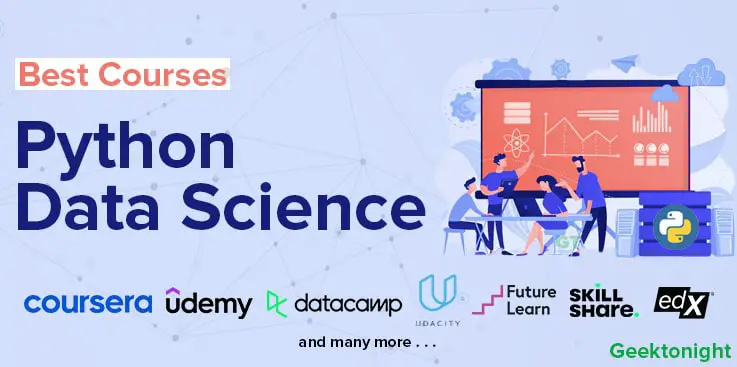Do you want to become a data scientist? Data science jobs are in high demand due to technological advancements. Data scientists are in good hands with over 70,000 job openings. It is easy to pursue data science as a career when there are so many training options, including online courses and boot camps. You may know that Python is the most common language used for the world’s hottest technologies, such as data science, AI, and machine learning. If you want to pursue any of these fields, you must know Python programming.
This article is for Python programmers or developers who already understand Python and use it every day. Here is the list of Best Python Data Science Courses where you will learn how to use Python for data science.
You may also be interested in checking out the list of the Best Python Online Courses if you are new to Python and wish to become a data scientist.

Why should you learn Python for data science?
During the past few years, Python has seen unprecedented growth. According to GitHub, Python is growing by 22.5% year-over-year in 2022. There has been a tremendous increase in Python jobs in recent years.
Currently, Glassdoor has more than 11,000 job postings for Python-related roles, while Indeed has around 14,000. At the moment, Indeed has nearly twice as many Python job openings as Java jobs, demonstrating the large Python job market.
One of the main drivers behind the growth of Python is data science and data analytics. It is arguably the single biggest reason why people migrate to Python. There are estimates that 17MB of data is created by everyone in the world every second. The need to organize and manipulate this data has never been more critical, and data analytics using Python makes sense.
If you are ready, take a look at the Best Python Data Science Courses in the given list.
Table of Content
- 1 Best Python Data Science Courses, Certification, Tutorials, Training, Classes Online
- 1.1 Applied Data Science with Python (University of Michigan) [Coursera]
- 1.2 Programming for Data Science with Python [Udacity]
- 1.3 Python for Data Science, AI & Development [Coursera]
- 1.4 Introduction to Python for Data Science [Datacamp]
- 1.5 Python A-Z™: Python for Data Science [Udemy]
- 1.6 Python for Data Science Course [Datacamp]
- 1.7 Python for Data Science and Machine Learning Bootcamp [Udemy]
- 1.8 Complete Data Science Training with Python for Data Analysis [Udemy]
- 1.9 Python Basic for Data Science [edX]
- 1.10 Master Python for Data Science [Linkedin Learning]
- 2 FAQ
Our product recommendations are unbiased and based on an independent review process. We may receive a commission for links to recommended partners. See our advertiser disclosure for more information.
Best Python Data Science Courses, Certification, Tutorials, Training, Classes Online
- Best Overall Applied Data Science with Python (University of Michigan) [Coursera]
- Best Runner-up Programming for Data Science with Python [Udacity]
- Best for Beginner Python for Data Science, AI & Development [Coursera]
- Best Budget Option Python A-Z™: Python for Data Science [Udemy]
- Best for ML Python for Data Science and Machine Learning Bootcamp [Udemy]
- Best for Basics Python Basic for Data Science [edX]
Applied Data Science with Python (University of Michigan) [Coursera]
This Data Science with Python Specialization introduces the learners to data science with Python. It consists of five courses to teach you how to implement statistical, text analysis, information visualization, and social network analysis techniques. You will learn about popular Python toolkits such as Scikit-Learn, Panda, Matplotlib, and others to scrape data from sites and visualize them to get insights. The University of Michigan will take you from beginning to advanced chapters of Applied Data Science.
Course Instructor
Christopher Brooks and other 3+ instructors created this Applied Data Science with Python Specialization for students to gain deep knowledge and apply data science methods. You need to cover all five courses to become an expert.
What You’ll Learn
Python programming will be taught in five courses in this University of Michigan specialization.
- Introduction to Data Science in Python: With this course, you will be able to use lambdas and manipulate CSV files. Also, it will explain the most common Python features and functionality used in data science and how dataFrame structures can be queried for cleaning and processing.
- Applied Plotting, Charting, and Data Representation in Python: This course will describe characteristics of a good and bad visualization.
- Machine Learning in Python: This course will describe the differences between descriptive statistics and machine learning.
- Text Mining in Python: In this course, you will recognize how Python handles text and use fundamental techniques for natural language processing.
- Applied Social Network Analysis in Python: This course will teach how to utilize the NetworkX library to represent and work with networked data. You will examine a network’s connection and learn Calculate a node’s relevance.
Pros & Cons
Pros
- Master skills with hands-on projects
- Certificate on Completion
- Financial Aid Available
Cons
- Paid Certificate
Key Highlights & USPs
- Learn the basics of Python programming techniques such as Lambdas, data manipulation, and cleaning data to get statistical analyses.
- How to apply the plotting, charting, and data representation in Python.
- Develop knowledge of how to improve data analysis strategies with applied machine learning methods.
- How Python helps to handle text mining and text manipulation using the Nltk framework.
- Grasp the understanding of how the Networkx library is used for social network analysis and explore the connectivity of networks.
- Get to perform on hands-on projects after completing each course.
Who is it for?
This Python Data Science Certification for beginners is for those who are seeking a path to become a data science expert. Upon completion, you will build skill sets to use for statistical, machine learning, information visualization, text analysis, and social network analysis and use Python toolkits like Pandas and more.
Rating: 4.5/5
Students Enrolled: 297,308
Duration: 5 months
Programming for Data Science with Python [Udacity]
Udacity brings you an online Data Science with Python Course to prepare you for a data science career. You will learn about data programming tools such as Python, SQL, command line, and Git. This Python Nanodegree Program will teach how to use Python and SQL to scrape data and store them for solving complex business problems.
Course Instructor
Learn this Udacity Python Course with the best team of data scientists and instructors for your future. This Python for Data Science course enables your programming skills for Data Science and gets ready for future data analytical jobs. As per the survey, 59% of companies that plan to build job positions will require data scientists and data analytics to make their business perform better.
What You’ll Learn
This Data Science Course is divided into three courses, namely:
- Introduction to SQL: This course will learn about JOINs, Aggregations, and Subqueries, among other SQL foundations. You will discover how to use SQL to resolve challenging business issues.
- Introduction to Python Programming: In this course, you will learn Python programming fundamentals such as data structures, variables, loops, and functions. By the end, you will be able to work with data using libraries like NumPy and Pandas.
- Understand Version Control: This course will help you discover how to use version control in the data science industry and how to share your work with others. Your work can be posted on Github.
Pros & Cons
Pros
- Get hands-on projects designed by industry experts
- Personalized feedback and suggested resources to improve
- Certificate on Completion
Cons
- Costly
Key Highlights & USPs
- Learn SQL fundamentals such as subqueries, Joins, and Aggregations.
- Understand concepts of Python programming such as data structures, variables, loops, and functions.
- Get to work with data using powerful Numpy and Pandas Python libraries.
- Gain knowledge of how to use control and apply real-life examples.
- Master the tech skills by performing on real-world projects and get feedback from experienced reviewers.
- Share your work on GitHub and introduce your expertise in the data science industry.
Who is it for?
The Data Science with Python Course is a suitable way for programmers and students to gain knowledge in Python and data science. This Python Data Science Nanodegree Program enhances your programming skills for Data Science and gets ready for future data analytical jobs. As per the survey, 59% of companies that plan to build job positions will require data scientists and data analytics to make their business perform better.
Rating: 4.5/5
Duration: 3 months
Python for Data Science, AI & Development [Coursera]
Python is best known for its simplicity and understandability. It is just another better language to write programs for Data Science, AI, and Machine Learning. This Coursera Data Science Python Course is the best place to learn Python and build your programming knowledge. You will get to apply Python fundamentals for retrieving data, visualizing and making better business solutions. With this best free online course for Python data science, you will explore the concepts of Python such as variables, data structures, data collection, and more.
Course Instructor
This Python for Data Science Coursera Program is designed by IBM and taught by Joseph Santarcangelo, a Data Scientist at IBM. It will transform you from Zero to Expert in Python programming. You can build machine learning models and data science applications using Python.
What You’ll Learn
This Coursera Online Python Data Science Program has 5 modules, each module helps you to build your programming skills.
- Python Basics: This module introduces the fundamentals of Python and starts by looking at some of the various data types, including strings, integers, and real numbers.
- Data Structures in Python: The use of lists and tuples as a means of storing collections of data in a single variable is covered in this module.
- Python Programming Fundamentals: This module will share fundamentals of Python such as branching and conditions in the programming.
- Working with Data in Python: The module starts with learning how to read and write files and continues with the top Python libraries for manipulating data and performing mathematical calculations.
- APIs and Data Collection: This module explores new applications of web scraping and APIs for data collection. You will determine the process of reading and gathering data when working with various file formats.
Pros & Cons
Pros
- Access to video lectures, quizzes, and reading materials
- Certificate on Completion
- Financial Aid Available
Cons
- Take more time to set up Watson
Key Highlights & USPs
- Learn to install Python and write your first program.
- Understand the concept of storing data values using data structures and dictionaries.
- Discuss the fundamentals of Python programming such as implementing loops, creating functions & classes, and perform exceptional handling.
- Learn to read and write files in Python.
- Discover the set of Python libraries to use for data manipulation and mathematical operations.
- Develop knowledge to collect data using APIs and web scraping for data analysis.
- It will polish your skills through hands-on exercises and a final project.
Who is it for?
This Python Data Science Course is best for anyone interested in learning about Data Science, Data Analytics, Software Development, Data Engineering, AI, DevOps, and a variety of other job fields should take this course. By the end of the course, you’ll feel confident to write programs in Python, interact with data, and automate real-world projects using Python.
Rating: 4.6/5
Students Enrolled: 324,157
Duration: 17 hours
Introduction to Python for Data Science [Datacamp]
Datacamp gives you an introduction to Python for Data Science in a simple way. You will learn the basics of data analysis in Python. Python is an object-oriented programming language used to extract insights from data. You will learn a new skill set to store and manipulate data using data analysis tools such as Numpy. This Datacamp Data Science with Python Syllabus consists of four parts to teach Python specifically for Data Science.
Course Instructor
The Creator and Data Scientist at Datacamp, Hugo Bowne has created this course to expand your knowledge and gain a competitive edge in the IT industry. Python is a popular toolkit among data scientists for its interactive scripts in conducting analyses. It will prepare you with data analytical skills and how to acquaint yourself with basic Python concepts.
Pros & Cons
Pros
- Unlimited access
- Certificate on Completion
Cons
- Short duration
Key Highlights & USPs
- Learn to create your first variables and use data types in Python scripts.
- How to use lists to store, clean, and manipulate data using methods like slicing.
- Understand how to handle a large amount of data and work with them efficiently.
- Leverage the code by using functions, loops, packages, and libraries.
- Discover how brilliantly Python developers can reduce the amount of code to use solving problems.
- Gain knowledge of Numpy and data arrays to explore the datasets from baseball matches and football matches.
- Free access to 11 video lectures and 57 practice exercises to sharpen the practical skills.
Who is it for?
This Python for Data Science training is available for learners with basic programming skills and who want to jump start their career in Data Science. It’s a beginner-level course for students and professionals to become part of the booming data science industry. After finishing this beginner course, learners will be able to use some of the popular tools such as NumPy and use them for real-world projects.
Rating: 4.4/5
Students Enrolled: 3,345,936
Duration: 4 hours
Python A-Z™: Python for Data Science [Udemy]
Learn A to Z about Python programming for data science and data analytics. ! This Udemy Python for Data Science Program introduces you to the concepts of statistical analysis, data mining, and data visualization. It will teach you the core programming principles of Python at the next level. You understand how to create lists, use functions and tuples in Python for collecting data, storing data, and analyzing them. You will use packages and libraries of Python such as Numpy and arrays.
Course Instructor
Kirill Eremenko, a data scientist and author of this Python Data Science Tutorial for students to learn Python step-by-step. It covers the valuable fundamentals that you can apply in data science and data analysis. This Python training program is packed with live examples to teach you how to solve problems using analytical skills.
Pros & Cons
Pros
- Short but in-depth course
- Certificate on Completion
- Financial Aid Available
Cons
- Lot of reference to older version
- No free audit
Key Highlights & USPs
- This Udemy Python for Data Science Online Course is divided into 8 sections and each section is divided into 4 to 9 lectures that train you to solve real-life analytical challenges.
- Learn to write and read programs in Python.
- Understand how integers, floats, and other data types work in programs.
- Install Packages in Python and use Jupyter Notebooks for Coding.
- Learn to use data frames for importing Data into Python.
- Build dashboards with Seaborn, Python library for data visualization.
- Improve programming skills by working on real-life projects like world trends, movie domestic percentage gross.
- Get unlimited access to six articles, 11 hours of on-demand video, and homework after each course.
Who is it for?
This Python for Data Science Course is perfect for all skill-levels from any academic background and profession. Even If you have no programming or statistical knowledge, you can become a data scientist with this course. After successfully completing this training course, you will learn valuable concepts that you can apply to real-world challenges.
Rating: 4.6/5
Students Enrolled: 132,430
Duration: 12 hours
Python for Data Science Course [Datacamp]
This Datacamp Anaconda Python Course is to get started with Python and learn the essential Anaconda skills for data science and machine learning. If you don’t know a single dime about Python, this course provides a perfect track for beginners. You will understand aspects of Python and how it is used to automate complicated tasks. Anaconda is the most popular Python distribution platform used by 25 million users worldwide. It is a data science toolkit that equips Python packages and libraries to build machine learning models.
Course Instructor
This free Python Course for Data scientists is created to join the world of data science and upgrade your career to a new level. You will gain practical knowledge of how Anaconda works with Python open-source libraries such as Scikit-learn, Pytorch, and Tensorflow.
Key Highlights & USPs
- Learn how to install Anaconda Python on your computer.
- Introduction to the Unix command line and know how to run programs on clouds.
- Build an understanding of how to combine existing programs in new ways and automate repetitive tasks.
- Introduce version control with Git to store information and explore a repository history.
- Create interactive and versatile data visualization using Bokeh.
- Improve coding skills by watching videos and practice on real-world examples under the guidance of expert instructors.
Who is it for?
It’s a free Datacamp Python Course to accelerate your career. Anaconda is easy to download and use to share your code on clusters. This Python tutorial is for beginners in partnership with Anaconda to start learning for free. You can add this valuable skill to your resume by grabbing this one-time opportunity.
Rating: 4.4/5
Students Enrolled: 6.7 million
Duration: 12 hours
Python for Data Science and Machine Learning Bootcamp [Udemy]
Udemy Python Data Science Course teaches you to use Python libraries such as Pandas, Seaborn, Numpy, Scikit-Learn, TensorFlow, and more. You will learn about the general-purpose programming language and its use in analyzing data, creating a visualization, and writing algorithms for machine learning. This Data Science with Python course covers all the topics to get a deep knowledge of how data science and machine learning use Python to solve the world’s problems.
Course Instructor
Jose Portilla is the author and instructor who included each piece of information to enhance your knowledge. It is packed with hundreds of HD video lectures and detailed code notebooks for every lecture. This Comprehensive program has both beginner and intermediate-level courses to learn how Python in Data Science works.
Pros & Cons
Pros
- Full lifetime access to downloadable resources
- Certificate on Completion
Cons
- Need programming experience
Key Highlights & USPs
- This Udemy Python Data Science Bootcamp has 27 sections and 165 video lectures to teach how to use Python libraries for data science and machine learning.
- Learn to use Pandas for Data Analysis and Seaborn for statistical plots.
- Develop an understanding of machine learning fundamentals such as logistic regression, neural networks, linear regressions, and so on.
- Learn How to use Scikit-Learn for machine learning tasks.
- Use Python’s libraries like Matplotlib and Seaborn for Data Visualization.
- Create in-built interactive and dynamic visualization to visualize patterns in datasets.
- Understand Natural Language Processing and Spam filters to work with machine learning models.
- Get full lifetime access to 25 hours of on-demand video, 13 articles, and five downloadable resources.
Who is it for?
This python for data science tutorial is ideal for beginners and experienced programmers to build a rewarding career in Data science and machine learning. With the completion, you will be rewarded with a certificate to get a jump in your career and be able to use machine learning with Python.
Rating: 4.6/5
Students Enrolled: 475, 119
Duration: 25 hours
Complete Data Science Training with Python for Data Analysis [Udemy]
This Data Science Training with python Course is a complete guide for you to learn data science using Python. It’s a full 12 hour Python Data Science Bootcamp to teach you statistical modeling, data visualization, and deep learning in Python. It covers all the aspects of Python and its packages used for storing, mining, cleaning, and manipulating data. It helps you with the implementation of Python-based data science methods on real-life data to solve business challenges.
Course Instructor
This Udemy Data Science Tutorial is created by Minerva Singh to share a complete knowledge of advanced data science techniques and how to use Python-based Jupyter Notebooks for coding. It will equip you with skills to perform different statistical data analyses and visualization for data modelling. Students will get a deep understanding of data science techniques and the best technique to interpret the data.
Pros & Cons
Pros
- Full access to articles and certificate of completion
Cons
- Require more practical examples
Key Highlights & USPs
- This Udemy Data Science Python Course comprises 12 sections and 124 video lectures to learn statistical modeling, data visualization, and machine learning in Python.
- Install Anaconda and work with the framework Jupyter Notebooks for data analysis.
- Discover data science techniques for web scraping and cleaning data from different sources.
- Learn about statistical techniques such as linear & logistics regression and Python packages such as Numpy, Pandas, Scikit, etc.
- Know how to implement supervised and unsupervised techniques on real-life data.
- Carry out the data exploration tasks such as Tabulation, pivoting, and data summarization in Python.
- Develop knowledge of how to build neural networks and deep learning algorithms.
- Get full access to 13 hours of on-demand video, six articles, and one downloadable resource.
Who is it for?
You can enroll in this data science training with python with no prior experience in Python and machine learning required. With 24/ 7 guidance from technical mentors and hands-on projects, you will become proficient in machine learning and deep learning using python. After successful completion, you will master the art of utilizing Python to carry out basic data explorations and visualizations, statistical analysis, and machine learning.
Rating: 4.3/5
Students Enrolled: 8K
Duration: 12 hours
Python Basic for Data Science [edX]
If you don’t know where to get started with Python, then this Python Basic for Data Science is the perfect option for you. You will learn the basics of Python programming and be able to write your first set of instructions. IBM offered this online python tutorial to prepare you for creating your own Python scripts for data science.
Course Instructor
Joseph Santarcangelo is an IBM data scientist who designed this course to give a taste of how to work with data in Python. Data Science is the field of studying raw data and analyzing them to make better decisions. Python is a useful tool to extract data and filter valuable information from them.
Pros & Cons
Pros
- Graded assignments and exams
- Unlimited Access to course materials
- Certificate on Completion
Cons
- Limited access in free versions
Key Highlights & USPs
- Learn what Python is and how it is used for data science.
- What is the Python application that works for data science?
- How to define variables and data types in Python.
- Understand et and conditional statements.
- What is the purpose of using functions in Python?
- How to read and write files in Python.
- Grasp a firm hand on using Pandas library for performing data analysis.
Who is it for?
This edX Python for Data Science classes is a beginner-friendly course that provides study materials and practice exercises through lab exercises. Learners who will complete this IBM course earn a verifiable and digital credential that skills acquired. With this course, you will get a taste of Python as a programming language, as well as working with data.
Rating: 4.5/5
Students Enrolled: 400K
Duration: 5 weeks, 5 hours/week
Master Python for Data Science [Linkedin Learning]
Linkedin Learning provides a pathway to master Python for Data Science. You will quickly learn the Python programming language to apply for data science development. This Linkedin Python Class helps you to build analytical skills to explore the scientific aspects of Data Science. It comprises a set of 10 courses to make you a proficient data scientist. You will explore the Python Scientific Stack tool to complete data science tasks.
Course Instructor
You will become an expert in Data Science Python with the guidance of data scientists and tech experts. This Linkedin Learning Data Science program has a sorted curriculum to teach you everything from the basics of object-oriented programming principles and powerful methods of Python.
Pros & Cons
Pros
- Get 1-month free trial
Cons
- Need basic Python knowledge to go through the content
Key Highlights & USPs
- A series of 7+ courses to start your journey of advancing your Python skills for data science.
- Learn how to use Python tools and techniques to solve business challenges.
- Develop skills to write scripts, create modules, and integrate a database with Python 3.
- Discover the ways to clean, transform, analyze, and visualize data.
- Use machine learning methods to generate predictions and automate routine tasks.
- How to use Python’s Libraries such as Numpy and Pandas to analyze data sets.
- Explore data, ingest data, and visualize data using Python.
- Build accurate and engaging dashboards for data visualizations
Who is it for?
This online LinkedIn Learning Specialization is suitable for beginners and intermediate programmers looking to extend their basic analytical knowledge. Upon completion of this advance training program, you can apply that knowledge to data science related projects
Rating: 4.4/5
Duration: 1 day, 5 hours
FAQ
Is Python important for data science?
Python has become a preferred tool for data scientists for business challenges. It provides functionality to deal with mathematical and statistics functions. It has a large set of libraries to perform complex tasks and build data science applications. This simple and accessible programming language reduces the time of execution and increases the productivity of doing complicated tasks.
Which is better R or Python for data science?
R and Python are both open-source programming languages that are well-suited for data science tasks. The only main difference is that Python is a general-purpose programming language used for data analysis and building data science applications, whereas R is used for deep statistical analysis.
If you have no programming experience and are looking to make a career in data science, Python is the best-to-go tool. If you are a statistician and can understand the advanced functionality of R, you can go for R programming for data exploration and experimentation in data science.
Is Python data science easy to learn?
Yes, Python is easy to learn and a good language for beginners. It has a simple syntax to read that makes industries use it for analytical research within web applications.
You can take any best python data science course from the above list discussed in detail with you. If you want to learn only Python, you can take the Best Python courses and Certifications from GreekTonight.
Can I get a job with a data science certificate?
Yes, you can get a job with a data science certificate from any popular website and institution such as Udemy, IBM, University of Michigan. Online Courses like the IBM data science professional certificate on Coursera can help you to get the desired job or get hired for an associate-level post in the field of data science.
How much can you make with a data science certificate?
A data scientist can easily make between $ 95,000 – at high, $ 250,000 with a data science certificate.
Thank you for Reading! I hope you enjoyed the article on the Top Python for Data Science Courses and Certifications. If you are ready to take these courses, I would like to suggest you learn Python courses. I will shortly come with new topics related to Python, Data Science, and Artificial Intelligence. If there’s any course you want to mention, you can let me know in the comment section below. Keep Reading and subscribe to our newsletter for more updates!











